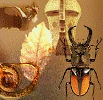Museum, University of Nebraska State

University of Nebraska State Museum: Programs Information
Date of this Version
1994
Abstract
The word "paleontology" is derived from the Greek words meaning "the science or study of ancient life". Usually, paleontology does not concern itself with human remains, artifacts or cultures; these are the realms of archeology and anthropology. Paleontologists excavate and study fossils, the remains of once-living plants and animals. By convention, such remains must be at least 10,000 years old to be considered fossils. In North America, there is very little overlap between the sites and materials that are studied by paleontologists and by archeologists because humans are relative newcomers to the continent. A site which produces 11,000 year old mammoth bones, for instance (there are several in Nebraska), is considered very ancient by archeologists but very young by paleontologists. Vertebrate Paleontology deals with the remains of the "back-boned" animals such as mammals, birds, reptiles and fish, and, of course, dinosaurs.


Comments
Published in Museum Notes (February 1994) No. 87: 4 p.